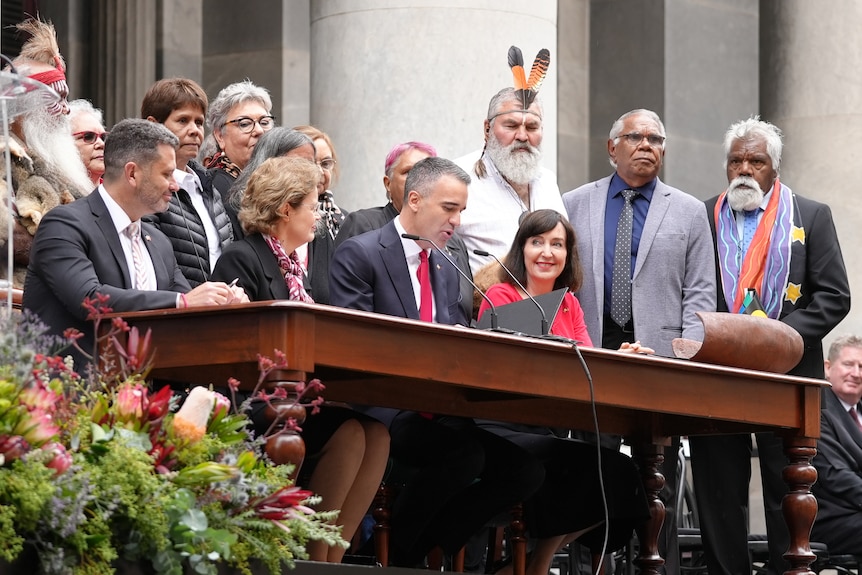
VANGUARD - Expressing the viewpoint of the Communist Party of Australia (Marxist-Leninist)
For National Independence and Socialism • www.cpaml.org
(Above: SA Voice signing ceremony Photo: Evelyn Manfield ABC News)
On Sunday 26 March, about 2,000 people gathered on North Terrace outside SA Parliament House in Adelaide to witness the SA First Nations Voice become law.
Among the crowd were a large number of First Nations People, trade unionists and other non-Indigenous people.
It is safe to say that 99% of people present were full of hope for the future regarding the well-being of First Nations People and the need to recognize in practice that we live on Aboriginal land, always was and always will be.
A sobering but powerful Welcome To Country from a Kaurna Elder was conducted on the steps of Parliament House rather than inside the Parliament House.
Then the Voice legislation was passed unanimously inside the Parliament as people watched on large screens set up on the steps of Parliament House.
Next, the Governor of SA, remnant of unsettler colonialism, arrived to join other members of the Executive Committee of Government at a table on the steps of Parliament House. The Governor, representing the British Crown, gave her assent to the Voice legislation. The Voice document was then signed by the Committee which also included the Premier, Deputy Premier and Attorney General.
This was followed by well-received speeches by Premier Malinauskas and Attorney General Kyam Maher, himself a First Nations person.
The SA First Nations Voice under SA law could be enacted without a Referendum.
The SA Voice will consist of 46 members covering six regions across the State, with an even number of men and women from the respective regions.
As to be expected of a document written by lawyers, the legislation is full of legalese - the usual lawyer speak of all Acts of Parliament - designed so the little people can't understand it. The new Voice law will exclude First Nations with a police record which will limit the number who can stand to be a rep.
Then there are so many checks and balances that an elected person has to be aware of once elected.
And all this just for an advisory body!
That is what the SA Voice will be, and while it will have moral authority, neither the Parliament nor the Government of the day will have to include advice from the Voice in any decisions made on matters affecting the lives of First Nations Peoples.
The Premier in his speech made the point that there will be differences of opinion between the Government and the Voice advisory body on some matters.
Therein lies the test of the significance of the now legislated SA First Nations Voice. The Premier Peter Malinauskas and his Labor Government will have to make decisions where there is likely to be direct conflict between the Government's position and First Nations People.
An example of an issue that the SA Government should walk with First Nations People is the Federal Government's desire to have a nuclear waste dump at Kimba. That matter is currently before the Federal Court of Australia. The SA Government has so far just stated that First Nations People should "have a say" on the establishment of this proposed nuclear waste dump.
People who witnessed today's SA Voice becoming law will be expecting more than that from the current SA Government.